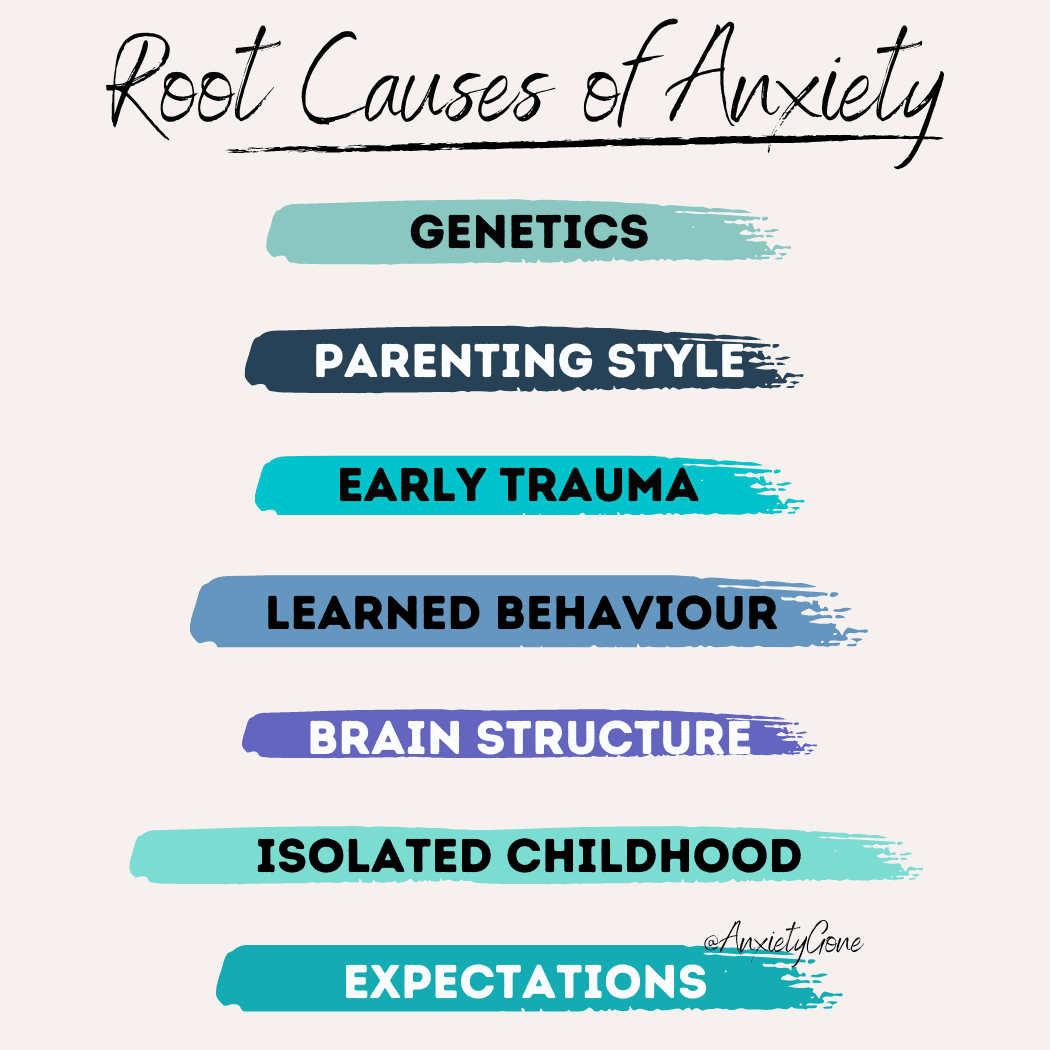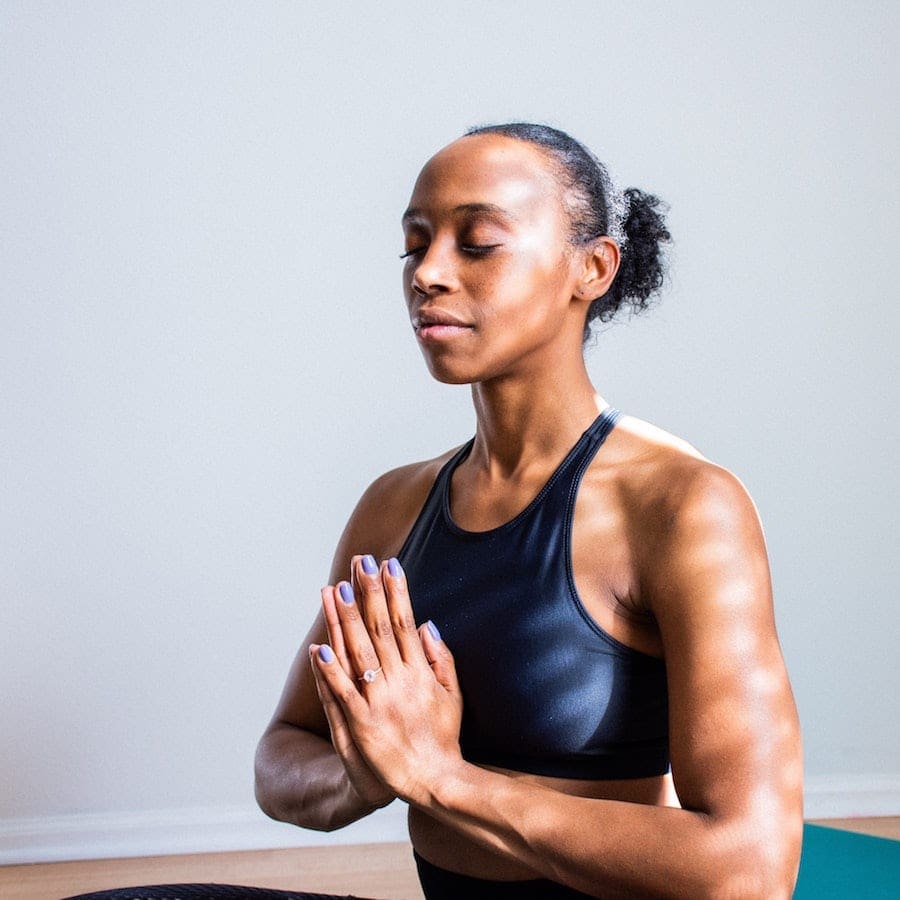Full Disclosure: Clicking on these links could mean a tiny commission for me, at no extra cost to you.
Anxiety can manifest in any ways. You likely know the exact things that trigger your anxiety and may even mistaken them as being the root cause. However, the root causes of your anxiety often go deeper than surface level. They’re usually buried deep into your subconscious and linked a painful experience, trauma or memory. While this isn’t always the case, the feelings you experienced when you first had anxiety are stored in your memory bank. In order to heal yourself fully – on a subconscious and conscious level – you have to get down to the root cause of the problem. Painful? Usually. Worth it? Absolutely.
What are The Root Causes of Anxiety
When it comes to the root causes of anxiety, they can typically be summed up in the following categories:
- Genetics
- Parenting Style
- Early Trauma
- Learned Behaviour (watching a parent with anxiety)
- Brain Structure
- Isolated Childhood
- Expectations
- Environment
However, the real root cause of your anxiety goes much deeper than these factors. You may even find that you identify with several different categories. For example, I contribute genetics, parenting style, early trauma, expectations and brain structure to be main sources of my anxiety disorder. But I also know, by learning how to find the root cause of anxiety, there’s a common denominator in all of these that is the real, deep, root cause.
Importance of Finding The Root Cause of Anxiety
Sometimes, ignorance is bliss. This is not the case when it comes to the root causes of anxiety. Just like anything in life, you can cut down all the leaves and tree branches but if you don’t remove the root, the tree will remain and sprout again. In other words, you can do all the healing you need to do on a surface level. This will provide you with relief and perhaps even long-term relief. However, the real reasons for anxiety will stay intact. In order to fully overcome anxiety and free yourself of the pain and suffering, you have to dig deep and get down to the roots.
How to Get to the Root Cause of Anxiety
Before we head into the exercises to find the root cause of anxiety, it’s important to fully understand what you’re getting into. Learning how to get to the root cause of anxiety isn’t always a pleasant experience.
Your brain has buried these things for a reason. Doing exercises to get to the root cause of anxiety can bring up emotions and memories that you may not expect, remember or even know you had. It can be a painful experience. The good news is that whatever comes up, no matter how hard it is, presents you with the opportunity to heal it. It’s kind of like taking one for the team, with you being the main player. You may feel a bit of a sting, but the win at the end is worth it. Most importantly, if you were to continue suppressing the root causes of your anxiety, inner healing wouldn’t be possible. So, go into the exercises to find the root cause with an open mind, set your intention and flow with the emotions that come up.
Shadow Work
One of the most common ways to learn how to get to the root cause of anxiety on a subconscious level is through shadow work. Created by psychologist Carl Jung, shadow work is an introspective psychological practice that anyone can do – anxiety or not, to live a more fulfilling life. It’s the process of bringing your subconscious pysche into your conscious experience to allow the positive aspects of the shadow to come through. In other words, it’s doing the work to become aware of your subconscious and finding the positive in the shadows of your past/subconscious. It’s about healing your wounded self.
With shadow work, you can get to the root cause of your anxiety and achieve greater authenticity, creativity, and emotional freedom.
How to Do Shadow Work?
Shadow work is a comprehensive process that can be done in many ways. You can choose whichever exercises resonate best with you but the main goal is to discover the underlying message of your wounded self. Your negative emotions are portals into the shadow and they help you bring forth your wounds and fears so that they can be healed. Here are some ways to do shadow work:
- Watch Your Emotions Exercise
- Pay attention to your emotional reactions toward other people so you can recognize what those emotional reactions are actually trying to tell you
- Talk To Your Shadow Self
- Start a dialogue with your shadow self to acknowledge its presence and to integrate it, positively, into your conscious
- Good and Bad Exercise
- Make a list of all the things you love about yourself… And all the things you don’t love about yourself and find acceptance with both
- Th 3-2-1 Work Shadow Exercise
- Choose someone or something you have a strong emotional charge with, such as someone who drives you up the wall or who pulls the worst out of you
- Imagine this person or thing and describe the things that bring out your negative emotions, either outloud or in a journal
- Speak to this person in your mind, as if they were standing right in front of you and ask questions about why they do the things they do, say the things they say, etc.
- Take on the qualities of this person that both you and put them into first-person statements, such as “I am angry”
- Pay attention to what you’re saying because the traits you are taking on are the exact traits you have been denying in yourself
Journaling
A personal favourite method for finding the root cause of anxiety is journaling. There are many different types of journaling you can do to tap into your subconscious and figure out what’s really going on there. I highly recommend writing to the person responsible for the “root cause” listed above, such as the person who caused you to experience trauma or an isolated childhood. Let it all spill out in this journal and keep it there. Some other types of journaling you can do include:
- Shadow work journaling
- Trigger tracking
- Art journaling
- Intuition journaling
- Automatic writing
Ask Yourself Questions
Another excellent exercise for getting to the root cause of anxiety is to ask yourself important questions, such as:
- What am I feeling?
- Why am I feeling this?
- How long have I been feeling different than I used to?
- What has changed in my life in the last two months, six months, year?
- Are there other times in my life where I felt the same way, albeit in a different situation?
- Is there a common thread here?
Meditation
As always, meditation is the pure definition of quieting your mind to see what comes up. It’s a powerful exercise for finding the root cause of anxiety, as it gives your subconscious a voice. You’ll be amazed at what comes up.
If you’re new to meditation (and not), I highly suggest trying Seven Minute Mindfulness. It teaches you how to meditate in seven minutes or less while also showing you how to activate your natural relaxation response.
Self Help
Knowledge is power. Never stop indulging in self help. Read every article you can; pick up every self-help book you can find and try everything and anything at least once. Implementing self help practices into your daily life will give you the knowledge needed to understand and learn how to get to the root cause of anxiety, and much more.
Try Online Therapy
Therapy is therapeutic. I’ve said it before and I likely won’t stop saying it anytime soon. Using online therapy and counselling is a huge component to overcoming anxiety, as you receive professional guidance for identifying the root cause of anxiety and healing it. I recommend for everyone to try online therapy vs. traditional therapy because it’s much more affordable and convenient. You don’t have to wait on a month-long list to get started and you also get assigned the best therapist for you specifically. So, give online therapy and counselling a try.










